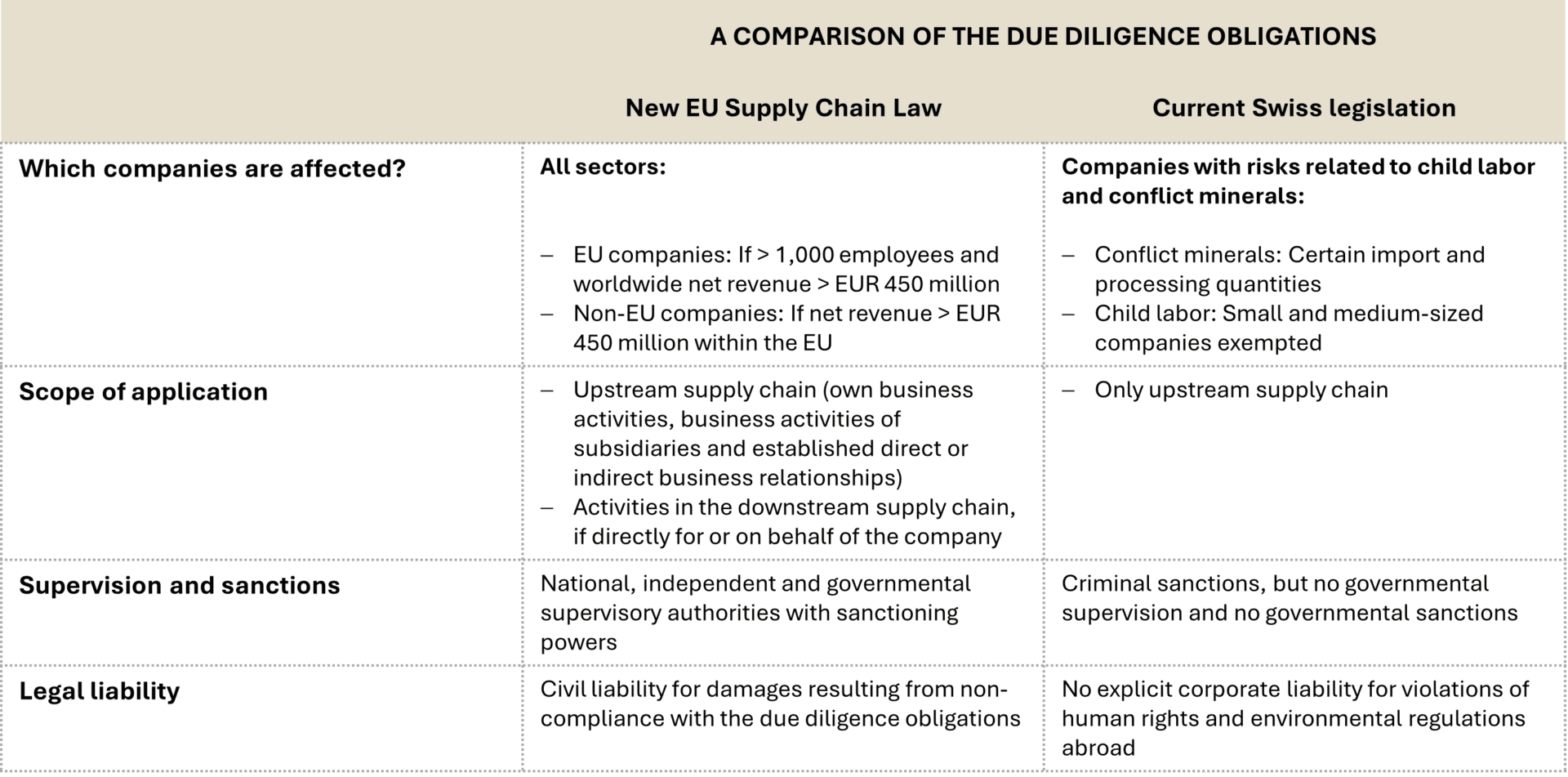
On November 29, 2020, the Responsible Business Initiative – demanding the introduction of legal liability for human and environmental rights violations for Swiss companies’ activities abroad – was narrowly rejected. Now the debate starts from anew. On April 24, the European Parliament adopted the Corporate Sustainability Due Diligence Directive (CSDDD, also known as the Supply Chain Law). The Council of the European Union and therefore the member states have now also given their final approval to the directive. The Supply Chain Act is expected to come into force in the first half of the year following its publication in the Official Journal of the EU. The new directive obliges large companies to identify human rights and environmental impacts of their business operations and to remedy or minimize these. The measures taken must be monitored and their effectiveness reviewed regularly. These due diligence obligations extend to large parts of the supply chain. Companies are liable for violations and can be sanctioned.
The provisions of the indirect counterproposal to the Responsible Business Initiative (Konzernverantwortungsinitiative) entered into force in Switzerland on the 1st of January 2022. These provisions in the Swiss Code of Obligations bind large Swiss companies to report on the risks of their business activities in various areas, such as the environment, human rights, and corruption. The EU’s new Supply Chain Directive goes further than that. While the Swiss due diligence obligations only apply to companies with risks in the areas of child labor and conflict minerals, the new EU rules apply to all sectors and are much more detailed. Swiss companies must also comply with these rules if they are active in the European single market.
The new EU due diligence obligations vs. current Swiss legislation (Sources: Meyer et al. im Auftrag von BJ und SECO, 2023 / BJ, 2022 / Shearman & Sterling, 2024)

Switzerland does not have to adopt the EU directive. However, in the past the Federal Council has emphasized several times that the corresponding Swiss rules should be adapted to international standards. In a review, the Federal Department of Justice and Police (FDJP) declared that the corresponding EU regulations are an important point of reference. NGOs and politicians are increasing their pressure on the Federal Council to adapt the Swiss legislation. Shortly after the decision of the EU Parliament, the IG Detailhandel (with Coop, Denner, Migros and others) spoke out in favor of a precise and comprehensive adaptation – without a “Swiss Finish”. Whether the CSDDD will be adopted fully or partially remains to be seen – and is ultimately a political decision. The Federal Council has already stated that it would first like to observe how the EU member states implement the directive and only then decide on how to proceed.
It is already clear that the EU’s due diligence obligations will have a direct impact on Switzerland. Swiss companies that are active in the European single market, are subject to the CSDDD, in accordance with the third country regulation. According to an external study commissioned by the Justice and Economics Departments, 160 to 260 Swiss companies would be affected by this third country regulation. However, these figures must be reviewed, as the EU directive has been significantly weakened since the original Commission draft on which this study was based. Nevertheless, it seems clear that the directly affected companies in the EU are likely to pass on some of the due diligence obligations to smaller Swiss companies that are part of their value chain.
Inactivity is not an option for a forward-looking corporate management. Swiss-based companies should now evaluate whether and to what extent they are affected by the new EU regulations and examine the introduction of new due diligence processes. They should also take the possibility of an adoption of the EU rules into Swiss law into account. Although this could still take a long time (Federal Council decision, potential referendum, etc.), developments should be closely monitored. Strategies and procedures for contingency scenarios can already be prepared now.